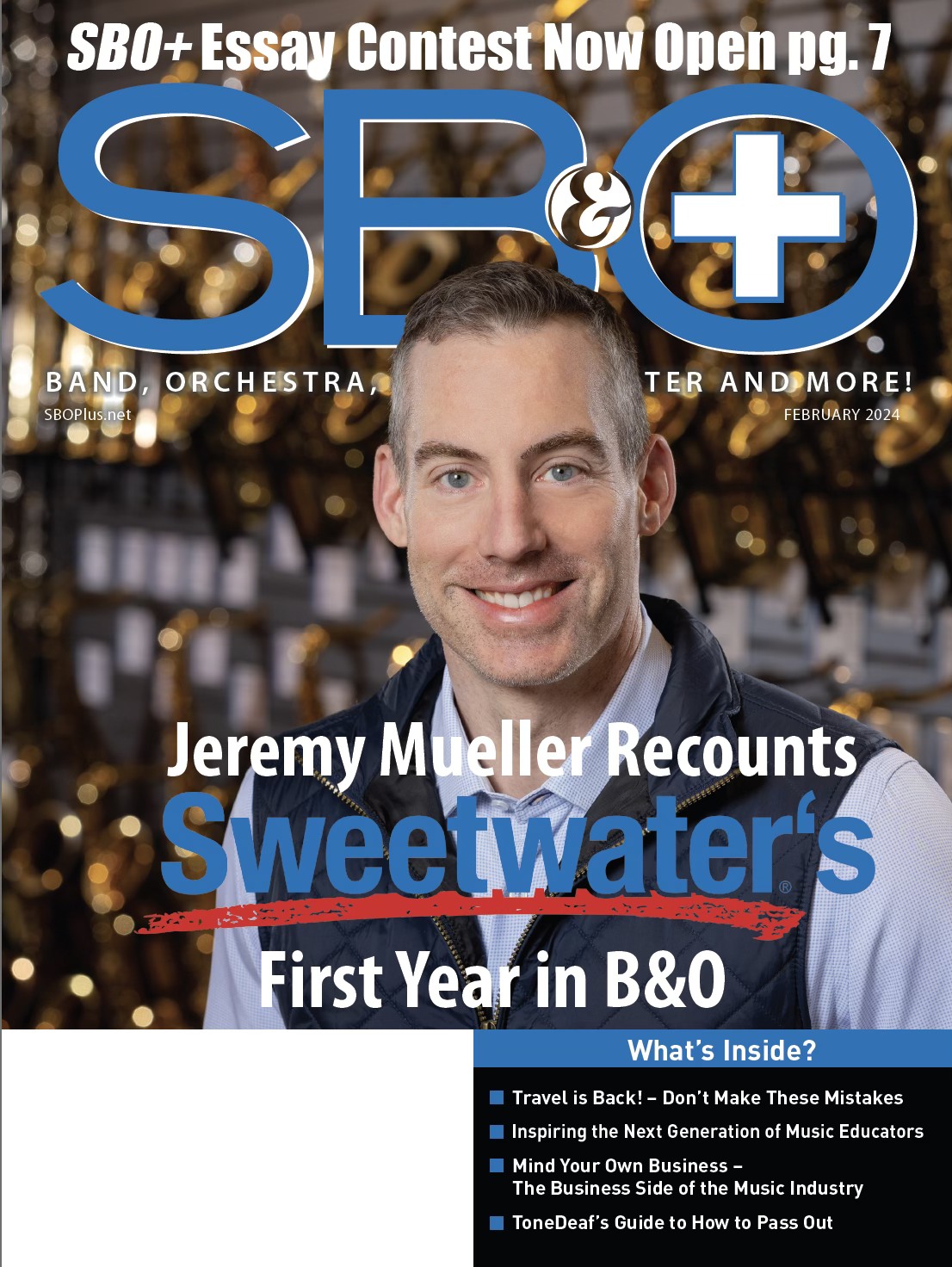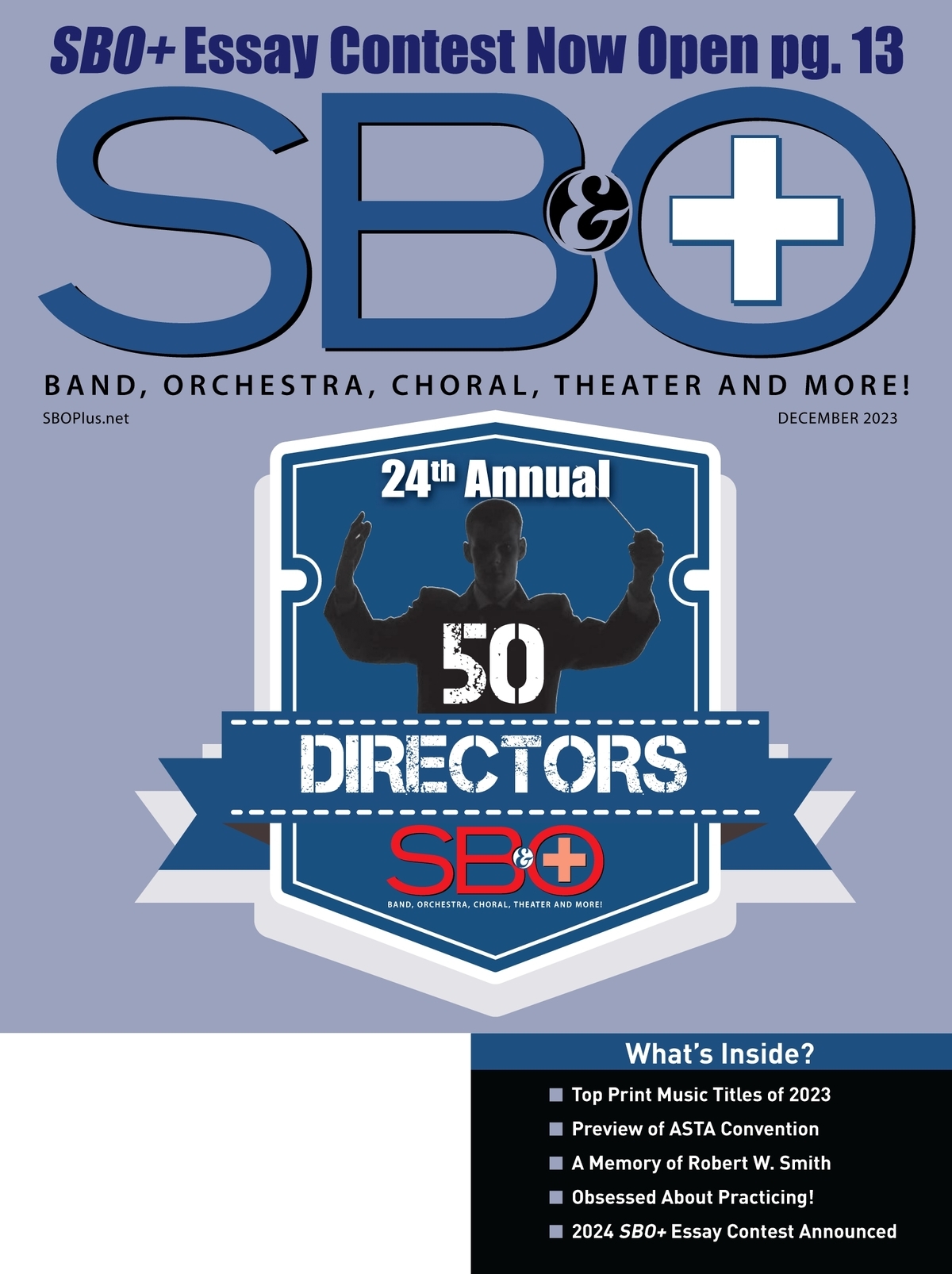EDUCATORS SUBSCRIBE FOR AS LOW AS $0.00! CLICK HERE!
-

Playing For Yourself
Mike Lawson | October 21, 2006By Christian Wissmuller
An accomplished performer, author, and clinician (www.kwylie.com), Wylie recently spoke with SBO about how he keeps his program running at maximum efficiency, his notions on what defines "success," and his hopes for the future.
Read More... -

Go East, Young Band!
Mike Lawson | October 21, 2006Band and orchestra directors interested in a unique travel opportunity that incorporates musical, social, cultural, and educational experiences should consider Asia.
Many schools and communities in Japan, China, and other Asian nations are seeking sister-school relationships in the United States.
Forging a connection with such a school can lead to experiences for students that will have both greater depth and less cost than many so-called “educational” tours organized by travel agencies. The key is to create a dream and to implement it with directors and their colleagues doing the legwork. Yes, the process is labor intensive, but it results in a long-term relationship with the sister school or community that continues for decades. Our experiences will, I hope, inspire and give direction.
Read More... -

Solo Success in Middle School
Mike Lawson | October 21, 2006By Mike Pearce
The middle school band is playing flawlessly, then a couple of solos have you wincing. Can you remember a concert where the band excelled but the soloists didn't? Was it your band? If you've had a problem with solos, there are four areas you may want to consider.
Selecting Soloists
How do you pick soloists? If your first chair players study privately and automatically get the solos, stay with that plan if it's working well. On the other hand, if you encounter resistance from your first chairs about taking solos - or worse, if nobody in the section wants them - have the entire section rehearse them as solis until a week or two before the concert, then have tryouts and designate solo players.
Read More... -

Festivals and Travel: 20 Destinations for Bands and Orchestras
Mike Lawson | October 21, 2006Every year, your mailbox teems with brochures for music tours and festivals offering the most exciting experiences of your students' lives: unique performance opportunities, educational clinics, high-stakes competitions, spectacular attractions and entertainment. But which is the right destination for your ensemble?
Well, SBO cannot answer that question for you, but we can offer a peek at some of the top tried-and-true options throughout the travel and festival industry. These destinations offer both educationally valuable aspects as well as the all-important "fun factors" that both students and directors are looking for.
ANAHEIM
Read More... -

Instrument Crossovers: Seasons of Change
Mike Lawson | October 21, 2006
By Krysten OgrizovichThe auditorium lights are slowly turned back on, as the thunderous applause of proud parents, family, and friends dies down. The students, after taking their final bow at the end-of-the year spring concert, quietly shuffle off the stage. This day marks the end of the concert season.
The natural progression of the school music program takes its next step. Almost as smoothly as the seasons change from spring into summer, the mellow classics that are played in the concert season change to the bold, uplifting sounds that are suitable for a summer afternoon parade or a fall field show. Many students look forward to the freedom of marching season. Being outside, and not confined to the band room, is a nice and much welcomed change from the wintertime concert season.
For some, this transformation does not go as smoothly as the students or the conductor would like. Not all students just move their instruments outside to practice. There are a few small setbacks in the form of new instruments and new sounds. Marching band does not just mean learning to keep a straight line, or practicing a new formation. For a few student musicians, marching band could mean learning new fingerings, or having to learn how to read a new key signature, as well as learning how to march.
Read More... -

Inside the National Concert Band Festival
Mike Lawson | October 21, 2006 To be quite honest, the idea of performing at the Bands of America National Concert Band Festival (NCBF) did not appeal to me much at first. I admit that I did not readily associate BOA with anything but marching band competitions, and I thought it might perhaps be in our better interests to do more “local” performances, such as a Southern Division MENC or CBDNA convention. These types of performances would prepare us for our ultimate goal: Performing at the Midwest Band & Orchestra Clinic in Chicago.
To be quite honest, the idea of performing at the Bands of America National Concert Band Festival (NCBF) did not appeal to me much at first. I admit that I did not readily associate BOA with anything but marching band competitions, and I thought it might perhaps be in our better interests to do more “local” performances, such as a Southern Division MENC or CBDNA convention. These types of performances would prepare us for our ultimate goal: Performing at the Midwest Band & Orchestra Clinic in Chicago.Neil (Jenkins, also Director of Bands at J.P. Taravella) and I debated this issue back and forth. He espoused the positive points; I was hung up on some of the negatives. To be fair, I began to do some research on the festival and, after consulting with several directors who had previously attended the NCBF, I capitulated. It did not appear to be anything like a marching band competition – in fact, it wasn’t a competition at all. There would be no scores nor ratings, only the pleasure of performing for some of the most respected music educators in the field, and the privilege of playing in front of like-minded band members and their directors. It sounded like a great time, and I was convinced.
Read More... -

Percussion Section Management
Mike Lawson | October 21, 2006Your percussionists probably represent the best-organized and best-behaved sections in your band, right?
No? How odd, seeing as they are far away in the very back of the band, like to hit things, can't seem to sit still long enough for you to complete an entire sentence, and enjoy each other's company so much that all they want to do is talk about sticks, drums, CDs, and so on...
Read More... -

Self-Adjudiction
Mike Lawson | October 21, 2006Does judging your own band strike you as a silly notion, or could it actually serve a purpose? Try these techniques for some significant benefits for you and your band.
How It Works
Though nobody expects to attend a band festival and judge his or her own band, if you’ve been struggling to get better performance results and higher scores, self-adjudicating before the event can help achieve your goal. When you listen to concert recordings or rehearsal work tapes, place yourself in the role of an objective listener evaluating someone else’s band.
Read More... -

UpClose: Ohio State University’s Dr. Jon R. Woods
Mike Lawson | October 21, 2006 Read More... -

Upfront: Winter Guard International
Mike Lawson | October 21, 2005By DANIEL P. FYFFE
I must admit, when I decided to enter my unit into indoor competition with Winter Guard International (WGI), I wasn't quite sure what to expect: "Would this be too much of a time commitment?"; "Would my students enjoy competing?"; "Would the parents be supportive?" "How would other band staff members feel about this activity?"
Read More...
These were just a few of the questions bouncing around in my mind. Though I had something of an idea about the time commitment and some of the problems involved in competing (through observing other indoor competition activities), I did not foresee how the positive benefits would impact my percussion program. -

UPFRONT: MAINTAINING MIDDLE SCHOOL MUSICIANS
Mike Lawson | December 1, 2003Are you starting substantial numbers of students, then having them move away? Are you recruiting promising tuba, oboe, or French horn players, but finding few of them still around in the eighth grade? If you're serving a mobile population, there may be things you need to do to produce bands that play well, and also maintain your emotional equilibrium and sense of humor.
Focus Your Efforts
While a bigger band may be one of your goals, think which specific add-on instruments would make the biggest impact in your ensemble sound, then concentrate on finding students to fill those spots. If two more trombones or a couple of French horns and a tuba would make the greatest difference, sell prospective players on the idea of playing those instruments and let them know that you have those horns available, waiting for someone to play them.
Read More... -

How to Build a Percussion Ensemble
Mike Lawson | November 1, 2003Involving your school percussionists in band and orchestra can sometimes be a difficult task. Certainly there is a great deal of literature that utilizes a lot of percussion, and that music should be performed both for the sake of artistic integrity and for your percussionists to be involved with playing some meaty parts. But at times, the percussion section is often neglected due to the style of music being performed (i.e., a Bach chorale, symphonic music that does not involve a lot of percussion, etc.).
There are ways around this dilemma and it is possible to include your percussion section in these pieces. But so many times, and at all levels, the percussion section is left out, so to speak. While conductors are working on clarinet intonation, a difficult technical passage for the saxophones, balance in the low brass, etc., the percussionists are idle and often bored.
Those pieces that do involve a lot of percussion keep them happy and audiences enjoy watching your percussionists run around playing everything under the sun. But let’s face it: there is a lot of time in rehearsals where percussionists just sit around doing nothing.
Read More...





